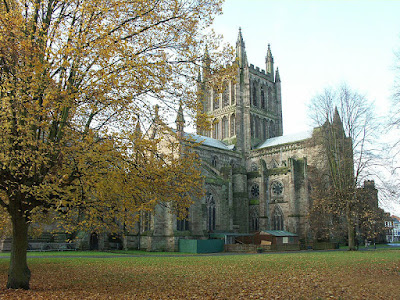With just two days to go before the official end of the Christmas Season perhaps it is time to take a dive into a longer piece. Fantasia on Christmas Carols by composer Ralph Vaughan Williams is a beloved staple of British holiday choral music. First performed at the Three Choirs Festival at Hereford Cathedral in 1912, the twelve minute piece is based on three English folk carols collected by Williams and his friend Cecil Sharp—The Truth Sent from Above, Come All You Worthy Gentlemen. and On Christmas Night All Christians Sing also known as the Sussex Carol.
 |
| Hereford Cathedral where Fantaisia on Christmas Carols was first performed at a choral festival in 1912. |
Williams was born at Down Ampney, Gloucestershire in 1872, the third child and younger son of the Vicar, the Reverend Arthur Vaughan Williams and Margaret Wedgewood. On his mother’s side he was related to the Unitarian Wedgewood family of porcelain fame and his great uncle was Charles Darwin. Despite his father’s Anglican orthodoxy he followed his maternal bent embracing religious freethought. After a brief period of proclaimed atheism as a young man, he settled into what he called “a cheerful agnosticism.” But he remained fond of the majestic cadences of the King James Bible, and some of the pageantry of Anglican worship, particularly its choral traditions.
Williams was taught piano from the age of five by his aunt Sophy Wedgwood and composed his first short piece soon after. By the age of 8 he was taking corresponded courses in music from Edinburgh University. His formal education began as a boarding school pupil at Field House preparatory school in Rottingdean and then at the public school Charterhouse. He was a fine student and athlete and organized choir concerts. In 1890 he left Charterhouse to study at the Royal College of Music in London where his affection for English choral music deepened.
But his family expected a University education and after a while left the College of Music to spend three years studying at Cambridge. He graduated as Bachelor of Music in 1894 and Bachelor of Arts the following year. Then returned to complete his training at the Royal College.
Williams had a small but reliable private income from his Wedgewood relatives which meant that after his education but was free to indecently pursue his musical interests. In 1895 he took a position as organist and choirmaster. At St Barnabas, in the inner London district of South Lambeth for an annual income of £50. He did not particularly enjoy the work but gained valuable choral experience. He left the job in 1899, married, and lived on his income after passing the examination for Doctor of Music at Cambridge. Soon after he published his first compositions.
Soon after the turn of the 20th Century Williams began his folk song collecting trips with Cecil Sharp and Lucy Broadwood that resulted in influential collections being published that helped preserve and elevate traditional music in England. He would use those songs by incorporating them into major choral compositions or as inspiration for his original works for the rest of his long life.
In 1907 Williams studied for a few months with revolutionary French modernist composer Maurice Ravel who he credited with helping to liberate himself from “the heavy contrapuntal Teutonic manner,” meaning the conventions of Handel, Brahms, and Beethoven that had been drilled into him in his English university education. But unlike Ravel’s other students, Williams never tried to ape his teacher. Ravel remarked that he was “my only pupil who does not write my music.”
 |
| Ralph Vaughn Williams in 191s, the year after the premier of Fantasia on Christmas Carols. |
The results of these combined influences were vigorous new choral pieces. Among the earliest which cemented Williams growing reputation was Fantasia on Christmas Carols for the 1912 music festival at Hereford Cathedral. He would go on to compose and/or arrange other Christmas music over the decades including the oratorio Hodie and individual carols like his definitive version of The First Nowell.
William’s musical career was interrupted by World War I in which he first served as an over-age ambulance driver private in France and Greece and later as a lieutenant in the Royal Artillery on the Western Front where the sound of the guns damaged his hearing which eventually resulted in virtual deafness later in life.
After the war Williams went on to a long career as a composer and conductor. In addition to his choral work he composed some of the 20th Century’s most beloved British symphonic pieces including A Lark Ascending, the ballets Old King Cole and Job: A Masque for Dancing, several operas, and some film scores. He was President of the English Folk Dance and Song Society from 1932 until his death.
Williams remained active and productive until his death in 1958 at the age of 85. He was then regarded as Britain’s most distinguished composer.
 |
| One of many recordings of fantasia on Christmas Carols. |
This 1966 version of Fantasia on Christmas Carols features the Choir of Guildford Cathedral under the direction of Barry Rose, baritone soloist John Barrow, and the Pro Arte Orchestra.
No comments:
Post a Comment